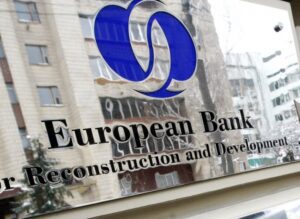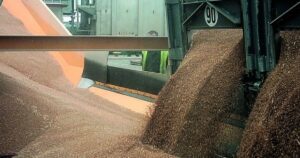
The European Medicines Agency (EMA) has recommended the use of Pfizer/BioNTech and Moderna vaccines adapted to protect against the Omicron coronavirus strain, the regulator said on Thursday.
The EMA Medicines Committee has recommended that two vaccines adapted for broader protection against COVID-19 be allowed to be used.
It notes that we are talking about vaccines aimed specifically at protecting against “omicron”.
According to the report, studies have shown that adapted versions of the vaccine “induce a strong immune response against Omicron and the original strain of SARS-CoV-2 in people who were previously vaccinated.”
Now the recommendation of the EMA committee will be sent to the European Commission, which “will make a final legally binding decision applicable in all EU member states”

The European Bank for Reconstruction and Development (EBRD) has amended the agreement on the ongoing Dolinskaya – Nikolaev – Kolosovka Railway Electrification Project, which will allow additional use of part of the EBRD loan in the amount of EUR98.5 million to provide liquidity to finance critical needs of JSC “Ukrzaliznytsya” (UZ).
Finance Minister Serhiy Marchenko, EBRD Director for Eastern Europe and the Caucasus Matteo Patrone, and Ukrzaliznytsia Board Chairman Oleksandr Kamyshin signed the corresponding documents on Thursday, the Finance Ministry reported.
The repurposed portion of the EBRD loan will be secured by a guarantee from the French government or another G7 country.
“Damage and destruction of the railway infrastructure, loss of Ukrzaliznytsia’s rolling stock have a negative impact on ensuring the smooth operation of the society. Therefore, an increase in the EBRD loan to support the liquidity of Ukrzaliznytsia will help maintain the stability of its work in war conditions,” Marchenko commented on the agreement.
As reported, earlier this year, on June 10, similar amendments to the agreement were already signed, according to which EUR50 million was directed to support the liquidity of Ukrzaliznytsia. Thus, the total volume of the EBRD loan for the liquidity of UZ reached EUR 148.5 million.

JSC “Ukrzaliznytsia” (UZ) in August 2022 exported a record 1.6 million tons of grain cargo since the beginning of Russian aggression, which is 1.74 times higher than in July (917 thousand tons), this growth was achieved thanks to the unblocking three Ukrainian seaports within the framework of the Istanbul grain agreements.
At the same time, 805,000 tons of grain were transported through land border crossings on the western border last month (in July – 716,000 tons), and 795,000 tons (190,000 tons) were delivered to ports, such data were announced by the Deputy Director of the Department of Commercial Work UZ Valery Tkachev during an online meeting with industry participants on Thursday.
According to him, in August, Ukrzaliznytsia loaded a total of 1.74 million tons of grain cargo into wagons, which is 18.7% of the total loaded volume of 9.28 million tons, and transported a total of 2.08 million tons of grain.
According to him, in August this year, the average daily loading of UZ wagons amounted to 56,000 tons. In early August, this figure varied between 24-40 thousand tons, but with the start of full-fledged operation of the grain corridor under the Istanbul agreements, loading increased to 50-80 thousand tons / day.
“We even have a record for the average daily loading of grain on August 31 – 91.53 thousand tons. I see that we will soon reach the threshold of an average daily loading of 100 thousand tons / day, and I hope that this will be already in September. In general, I see a very positive trend in the transportation of grain cargo,” the Deputy Director emphasized during the meeting.
In August, Ukrzaliznytsia also exported 107.9 thousand tons of sunflower oil, as well as 148.7 thousand tons of all kinds of meal, through land border crossings and ports.
The Deputy Director clarified that over the specified period, the average daily handling of wagons of all types at border crossings dipped slightly – to 1.848 thousand wagons from 1.86 thousand wagons in early August (by 15 wagons per day), however, the transfer of wagons for grain cargo increased by 18 % (+71 wagon/day) – up to 469 grain wagons per day against 398 units. in July.
The UZ representative clarified that by September 1, the total queue of wagons of all nomenclatures at the border had decreased by 21% (or 6.53 thousand wagons) compared to August 1, to 25.12 thousand units. from 31.5 thousand units. At the same time, by the indicated date, 8.48 thousand wagons with grain were in the queue (-15% or 1.5 thousand wagons by August 1), 433 wagons with vegetable oil (half as much) and 605 wagons with meal of all types (- 24%).
“This result was achieved because Ukrzaliznytsia took measures to improve the planning system. Let me remind you that this is the result of the fact that we began to coordinate loading plans according to the algorithm, guided by the delivery indicators for the previous month and taking into account the presence of queues. We are also working with carriers so that they do not inflate the plan, and we confirm only the volume that they are actually ready to take from them at the junction,” Tkachev summed up.

Stock indices of the largest countries of Western Europe are falling during the first trading session of autumn.
The composite index of the largest companies in the region Stoxx Europe 600 by 11:10 Moscow time decreased by 1% and amounted to 410.88 points.
The German DAX index falls by 1%, the French САС 40 – by 1.2%, the British FTSE 100 – by 0.9%. The Italian FTSE MIB and the Spanish IBEX 35 are down 0.9% and 0.7% respectively.
Traders in the region are considering the prospect of strong ECB rate hikes at the last two regulator meetings this year. On Wednesday, after the release of data on August inflation in the euro area, which broke a historical record, analysts published forecasts for the European Central Bank to raise rates by 75 bp at the September meeting, and by 50 bp at the October meeting.
At a meeting in July, the ECB raised rates for the first time in 11 years, by 50 bp at once. The base interest rate on loans was raised to 0.5%, the rate on deposits – to zero, the rate on margin loans – to 0.75%.
Retail sales in Germany rose unexpectedly by 1.9% in July compared to the previous month, data from the country’s Federal Statistical Agency (Destatis) showed. The rate of increase in the indicator became the highest since June 2021. Analysts polled by Trading Economics did not expect the index to change.
France’s Pernod Ricard SA, one of the world’s largest spirits producers, is down 1% despite the fact that the company increased its revenue by 21% in fiscal 2022 and raised its dividend by 32%, to 4.12 euros per share.
Shares of mining Rio Tinto PLC fell 2.6% at auction in London. The company has agreed to buy out a 49% stake in Canadian Turquoise Hill Resources Ltd. for $3.3 billion.
Papers of the British Reckitt Benckiser Group PLC, which produces hundreds of household chemicals and medicines, lose 4.7% in price. The company’s CEO, Laxman Narasimhan, will step down on September 30. The interim acting CEO will be Nicandro Durante, Senior Independent Director of the Supervisory Board.
The market capitalization of the Swedish investment company EQT AB falls by 3.3%. The company has set the size of the EQT Infrastructure VI fund, which aims to invest in infrastructure projects, in the amount of 20 billion euros.
The drop leaders among the components of the Stoxx Europe 600 are shares of Germany’s real estate alstria office REIT-AG, which shed 14.2%.

Agroholding Continental Farmers Group has completed the harvest of winter barley, wheat and rapeseed from a total area of 86.2 thousand hectares, a total of 446 thousand tons of crops have been harvested, follows from its press release on Thursday.
It is specified that the yield indicators for this season exceeded the planned ones. The average yield of barley was 6.37 tons/ha, wheat – 6.23 tons/ha, rapeseed – 3.56 tons/ha.
“We have crossed the equator of this year’s harvest – the first wave has been completed with a good result. We are satisfied with the yield for all crops, because there were certain risks due to the dry spring. We ship the harvested products to our own elevators, which we prepared earlier. Given the favorable weather, the other day we started digging potatoes,” the agricultural holding quotes its COO Vitaliy Stavnichuk.
In addition, Continental has begun sowing winter crops for the 2023 harvest – sowing of rapeseed on an area of 35.2 thousand hectares is nearing completion. It is also planned to sow winter wheat on 42.3 thousand hectares, and barley on 16.1 thousand hectares.
“Due to the weather conditions during this sowing period, maximum emphasis is placed on moisture conservation. Production technologies are used depending on the type of seeders involved in the work. This is either classic cultivation with Horsch Tiger cultivators and sowing with Horsch Pronto seeders, or conditional direct sowing, carried out immediately after harvesting wheat and barley with Horsch Focus and Claydon Hybrid 6T seeders,” the agricultural holding said in a press release.
“Continental Farmers Group” grows potato chips, seed and food varieties in Lviv and Ternopil regions. The total area under potatoes in 2020 amounted to 1.6 thousand hectares, in 2021 – 1.8 thousand hectares, with a total land bank of the group of companies of 195 thousand hectares in the western regions of Ukraine.
Agroholding Mriya and CFG, united under the name Continental Farmers Group, have been operating as a single business since November 2018, when Mriya entered into a deal with international investor Salic UK to sell assets.
Salic was founded in 2012. Its sole shareholder is the State Investment Fund of Saudi Arabia. Invests in the production of agricultural and livestock products.